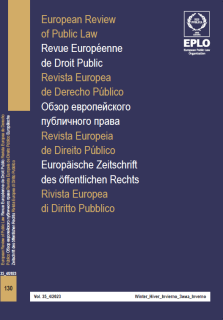
Ecclesiastical Legal Persons and Legal Protection of Constitutional Rights
father Ireneos – Antonios Giakoumakis
Lawyer of Nicosia, member of the Pancyprian Bar Association; Doctor of Public Law of the Faculty of Law of the University of Athens – BSc of Theology UOA
The paper deals with the constitutional rights or competences of the legal persons of the Church of Greece in principle, as well as the judicial protection of the rights of these religious legal entities. In the course of the research for this paper, it was ascertained that constitutional rights which derive from individual and collective religious freedom, develop both in the vertical church–state relation, with the rights being projected towards the state, as well as in the horizontal relation between the ecclesiastical legal persons when the church acts as state power, as such which by necessity acts, insofar as it is organized as a Public Law Legal Person. Such rights are projected towards senior or supervisory ecclesiastical authorities. In conclusion, when to the Church is attributed a state or public power, then the Church, and its legal persons, are more the recipients of rights rather than their subjects. Conversely, when the church–state relations remain distinct, without the one interfering with the action area of the other, then the Church is more of a bearer rather than a recipient of rights. Many matters analyzed in this paper could also apply, mutatis mutandis, to ecclesiastical legal persons outside of Greece, based in other EU countries.
L’étude aborde le sujet des droits ou compétences constitutionnels des personnes morales de l’Église de Grèce en principe, ainsi que de la protection judiciaire des droits de ces entités juridiques religieuses. Au cours de la recherche effectuée pour cette étude, il a été établi que les droits constitutionnels qui découlent de la liberté religieuse individuelle et collective, se développent à la fois au sein de la relation verticale église-état, les droits étant projetés vers l’état, ainsi que dans la relation horizontale entre les personnes morales ecclésiastiques quand l’église agit en tant que pouvoir d’état, qui agit par nécessité, dans la mesure où elle est organisée en tant que personne morale de droit public. Tels droits sont projetés vers les autorités ecclésiastiques supérieures ou de surveillance. En conclusion, quand l’Église est attribuée un pouvoir étatique ou public, l’Église, et ses personnes morales, sont plutôt des bénéficiaires de droits que leurs sujets. Inversement, quand les relations église-état restent distinctes, sans que l’une n’interfère dans le domaine d’action de l’autre, l’Église est plutôt porteuse que destinataire de droits. Beaucoup de questions analysées dans cette étude, pourraient également s’appliquer, mutatis mutandis, aux personnes morales ecclésiastiques en dehors de la Grèce, basées dans d’autres pays de l’UE.





















